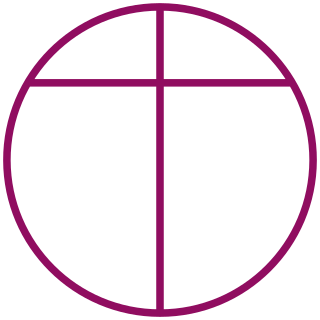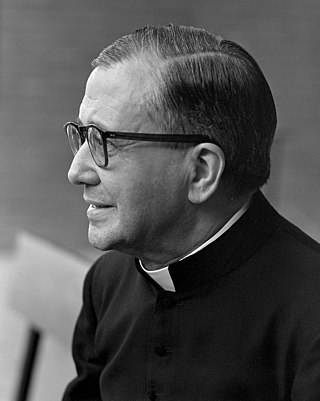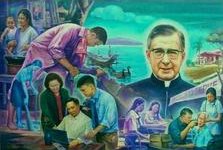
In Christian belief, a saint is a person who is recognized as having an exceptional degree of holiness, likeness, or closeness to God. However, the use of the term saint depends on the context and denomination. In Catholic, Eastern Orthodox, Anglican, Oriental Orthodox, and Lutheran doctrine, all of their faithful deceased in Heaven are considered to be saints, but some are considered worthy of greater honor or emulation. Official ecclesiastical recognition, and consequently a public cult of veneration, is conferred on some denominational saints through the process of canonization in the Catholic Church or glorification in the Eastern Orthodox Church after their approval.

Opus Dei was founded in Spain in 1928 by Catholic priest Josemaría Escrivá. Its stated mission is to help its lay and clerical members to seek Christian perfection in their everyday occupations and within their societies. Opus Dei has long attracted significant controversy regarding its political activities and its alleged cult-like practices.

Saint Josemaría Escrivá de Balaguer y Albás was a Spanish Roman Catholic priest. He founded Opus Dei, an organization of laypeople and priests dedicated to the teaching that everyone is called to holiness by God and to discover sanctity in their ordinary lives. He was canonized in 2002 by Pope John Paul II, who declared Josemaría should be "counted among the great witnesses of Christianity."

Álvaro del Portillo y Diez de Sollano was a Spanish engineer and Roman Catholic bishop. He served as the prelate of Opus Dei between 1982 and 1994 as the successor to Josemaría Escrivá.
Opus Dei and politics is a discussion on Opus Dei's view on politics, its role in politics and its members involvement in politics.
Opus Dei and Catholic Church Leaders discusses the comments and observations of popes, cardinals, and other leaders of the Catholic Church as regards the Personal Prelature of the Holy Cross and Opus Dei.
This is a bibliography of works about Opus Dei, also known as the Prelature of the Holy Cross and Opus Dei, which was founded by Josemaría Escrivá.

Teachings of Opus Dei are the teachings of the founder of Opus Dei, St. Josemaría Escrivá de Balaguer.
Opus Dei in society refers to the social mission, general social strategy, social activities, work, relationship with politics and other aspects of Opus Dei.

The Priestly Society of the Holy Cross is an association of Catholic diocesan priests which is integrally united to the Prelature of Opus Dei.
Opus Dei is a personal prelature within the Roman Church that has been the subject of numerous controversies. Throughout its history, Opus Dei has been criticized by many, including by numerary members who knew the founder and had roles in Opus Dei's internal government. The reports by former members in the US, England, Spain, Latin America, France, Germany, and other countries are published. Journalists have described it as "the most controversial force in the Catholic Church" and its founder Josemaría Escrivá as a "polarizing" figure.

John L. Allen Jr. is an American journalist and author who serves as editor of the Catholic news website Crux, formerly hosted by The Boston Globe and now independently funded.
Canonization of Josemaría Escrivá de Balaguer discusses John Paul II's decision to canonize Josemaría Escrivá, founder of the Prelature of the Holy Cross and Opus Dei, more commonly known as Opus Dei.
Juan Ignacio Larrea Holguín, was archbishop of Guayaquil for ten years, and the first member of the prelature of Opus Dei in Ecuador. He was also a distinguished lawyer, frequently consulted about Ecuadorian Civil law and the author of more than 60 books about jurisprudence.

Luigi De Magistris was an Italian prelate of the Catholic Church who served as Pro-Major Penitentiary of the Apostolic Penitentiary from 2001 to 2003 after working for more than forty years in the Roman Curia, more than twenty of them in the Apostolic Penitentiary. He was made a bishop in 1996, an archbishop in 2001, and a cardinal in 2015.

There Be Dragons is a 2011 historical epic war drama film written and directed by Roland Joffé. Set during the Spanish Civil War of the 1930s, it features themes such as betrayal, love and hatred, forgiveness, friendship, and finding meaning in everyday life. It includes the story of soldiers, a journalist, his father, and a real-life priest, Josemaría Escrivá, the founder of Opus Dei, who was canonized as a Roman Catholic saint.

Dora del Hoyo Alonso, was one of the first women members of Opus Dei. A domestic worker by profession, del Hoyo was the first to join the Prelature of Opus Dei as an assistant numerary meaning that she dedicated herself professionally to caring for people and looking after the material needs of Opus Dei centers. From 1946 until her death, she lived in Rome, Italy where she collaborated first with Josemaría Escrivá de Balaguer, Opus Dei's founder, and later on with his successors Álvaro del Portillo and Bishop Javier Echevarría, in the domestic management of the first Opus Dei center there, later the movement's headquarters. Her process of canonization was opened in Rome on June 18, 2012 by Echevarría, at the request of many who knew and worked with her. Her mortal remains lie close to the tomb of Escriva, in the crypt of Our Lady of Peace Church in Rome.

Guadalupe Ortiz de Landázuri Fernández de Heredia was a Spanish Roman Catholic professor and a member of the Opus Dei personal prelature. She was one of the first women to join Opus Dei, after meeting the founder Josemaría Escrivá in 1944. She helped start Opus Dei in Mexico and also collaborated directly with Escrivá in Rome. A serious heart condition eventually claimed her life in 1975.










